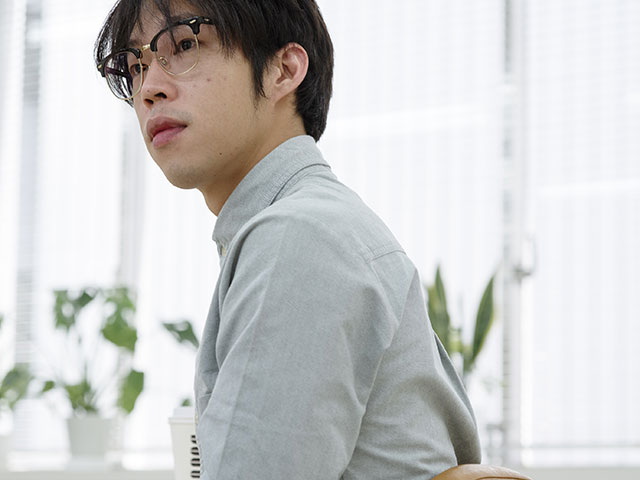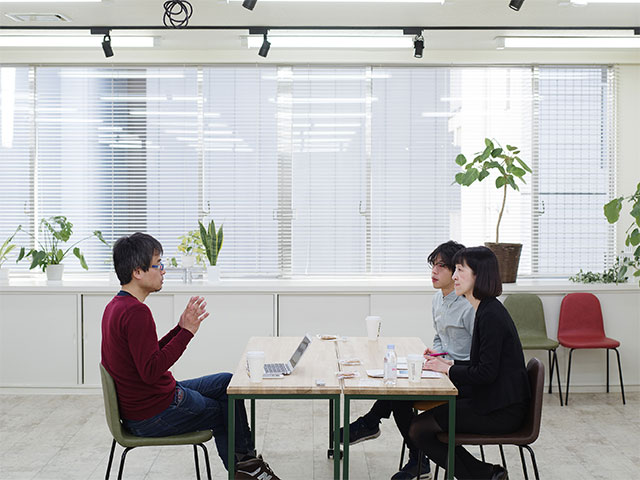
ASIA HUNDREDS is a series of interviews and conference presentations by professionals with whom the Japan Foundation Asia Center works through its many cultural projects.
By sharing the words of key figures in the arts and cultures in both English and Japanese and archiving the "present" moments of Asia, we hope to further generate cultural exchange within and among the regions.
How Democrazy Theatre Studio Came About
Chikara Fujiwara (hereinafter Fujiwara): Thank you for talking with me today. I do theater review, but I also create pieces and often work not only in Japan but also in the Philippines, Germany, China, and Korea. And even in events like TPAM, in which I participate in some form every year, there are more and more opportunities to speak with Asian artists. But actually I have never been to Thailand, even for sightseeing.
And in 2016 in the Store House in Ueno, I was unfortunately only able to see Hipster the King by the Democrazy Theatre on video after it was specially staged at the Store House Collection, Thai Week. But Girl X,*1 the collaboration you did at TPAM2015 with Hanchu-Yuei, was a very memorable performance that left quite an impression on me. So I came here with a lot of excitement to talk with you.
First, I'd like to ask you some basic questions about Democrazy Theatre. When and under what circumstances was the company launched?
*1 Girl X is originally written by Suguru Yamamoto and it premiered in 2013. After showing at TPAM2014, the Japanese version was shown in Malaysia and Thailand, and it developed into a co-production with various other countries. At TPAM2015, the co-production made with Thanapol Virulhakul was shown. That same year, it was also shown in Thailand.
Thanapol Virulhakul (hereinafter Thanapol): Democrazy Theatre was founded in 2008. Bangkok at that time still had very few black box theaters. As a result, there were not many spaces for performing dramas, so Democrazy Theatre was founded in order to provide an option for that.
The founder was not me, but Ms. Pavinee Samakkabutr. At that time, it was launched based on the conviction that "as long as you make good theater productions, the customers will surely come." Then since 2014, we have shown some kind of theatrical production at that theater every month. And thanks to that, the audience has increased, and Democrazy Theatre has become increasingly well-known. Although, now, we are no longer showing things every month.

Fujiwara: So did Ms. Pavinee leave and then you took over?
Thanapol: No, Pavinee still belongs to the Democrazy Theatre as a producer. It's set up so that Pavinee and I act as joint artistic directors. We act as the coordinators, and the other members work as artists and technical staff.
I use the term "members," but rather than us actually recruiting them, the fact is that without us even realizing it, the members naturally came together and formed a company. At first, it was a space for people who wanted to do theater. People who shared the same passion and wanted to do the same things naturally came together and became members of the company. So we have all kinds of people: one works as a lighting designer and another is an actor who graduated with a background in computer engineering.
Fujiwara: In that case―this will be an extremely basic question but―is Democrazy Theatre the name of both the company and the theater itself?
Thanapol: Technically speaking, Democrazy Theatre is the company name, and Democrazy Theatre Studio is the theater's name.
An Independent Theater Management
Fujiwara: Although there are a lot of different people involved, I imagine that putting on a production every month is a lot of work. Do you have repertory pieces that you rotate periodically?
Thanapol: Our theater started in the beginning with the intention of offering a space for people who wanted to do theater, and then we ended up trying to put on a production every month, so it was pretty hard. With the cooperation from those around us, we somehow managed to pull it off. In addition to me myself directing, we also want to help younger directors along, so we sometimes ask them for new works. There were also some past works that we modified. Also, not only do we put on productions in which Democrazy Theatre acts as the producer, but there are also some cases in which other companies borrow the space and put on productions.

Fujiwara: With regard to the operation of the theater, how is it financed? For example, do you receive subsidies from the government or anything like that?
Thanapol: There is no subsidy whatsoever from the government. Mostly we use what we earn from participating in projects overseas to run the theater.
Fujiwara: So that means, to state it in an extreme way, that you are basically going to other countries to work, then using the money earned from that to operate the theater?
Thanapol: Yes. After all, the revenue from admission fees doesn't amount to much either. Even if we have a full house, it would be impossible to cover all the operating expenses with that.
Fujiwara: I see. Operating an independent theater is a tough job anywhere. Even so, with its group structure that developed and grew spontaneously, Democrazy Theatre is very interesting to me. In Japan, except for unconventional companies like faifai where multitalented members are linked together without a hierarchy, in most cases the director, playwright, and troupe leader is all the same person, and the authority is all concentrated in that position. That is the usual pattern. But in other Asian countries you often see groups that, rather than having that type of pyramid-shaped, centralized structure, have a more flexible setup. By the way, since the members came together naturally, what is the average age in generational terms?
Thanapol: There are a lot of young people, so I think from twenty-three to about thirty years old.
Fujiwara: Oh, that's pretty young. In that case, you (aged thirty-four) are already quite the senior member?
Thanapol: Yes, I'm pretty much an elder [laughs].
Fujiwara: Is the age range of audiences also young?
Thanapol: The age of the audience varies depending on the show. For example, pieces that I direct have somewhat younger viewers. My works have strong concepts, and I have my own signature style, so the audience is a relatively limited group. But when it comes to works led by other directors that feature already established plays, the audience range is wide, including everyone from students to workers to even older people.
Fujiwara: Girl X with Hanchu-Yuei was like that too. And also, at least from watching it on video, your style was very radical, and I saw it as a contemporary expression that is different from so-called drama performance. From what you said now, it seems you yourself are pursuing that sort of avant-garde expression while, on the other hand, as the theater's artistic director, you're asking other directors to stage orthodox shows. Incidentally, in the case of text-based plays, do you do classic plays like, for example, those by Chekhov or Shakespeare? Or do you do plays by contemporary Thai writers?

Thanapol: There is a director that we rely on frequently, Adjjima Na Patalung. What we have her do is direct classic plays. At Democrazy Theatre Studio, we are doing a project called "Demo Classic" that involves directing the classics, and as part of that we put on masterpieces such as Shakespeare's Hamlet, for example. Incidentally, the play we are doing for this project this year is the American play called The Crucible.
Fujiwara: That's a work known in Japan as Rutsubo, written by Arthur Miller and premiered in 1953. In cases where you put on classics like that―and I'm afraid this is another detailed question―do you use an innovative method of production or, instead, a relatively orthodox style?
Thanapol: It's not an innovative method. We sometimes arrange the content of the play into a contemporary version or tweak it, but we put it on without changing the crux of it. As Pavinee is a text-based theater lover, in her view, a lot of classic plays still reflect our society today. Humanity has not changed much.
The Idea of "Choreography"
Fujiwara: I see. I've now got a mental image in which the Democrazy Theatre Studio and the members who naturally converged there are putting on plays in a wide range of forms. I'd like to focus our talk now on your own method of directing. Can I assume that you have some sort of distinctive mindset with regard to using the body? How do you yourself feel about your style especially with regard to the way the body is used?
Thanapol: I think my background as a dancer has a big influence. A dancer is not someone who simply dances in front of people. The way I see it, by moving the body, we broaden our ideas about life and create experiences. That's what I think dance is all about. So I place a high priority on expressions that uses the body.
Choreography in particular is important. That refers not only to the choreography on the stage, but as a "rule" I think it can be used even in everyday life in a lot of different ways. For all of us who live in this world, obviously we are not free to do anything we want. For example, just like the rule "When the light turns green, you can cross," or "Stop at the red light," what we can and cannot do is determined by rules. In the same way, choreography for me is similar; establishing things like laws makes it possible to design our lives.
Fujiwara: That can be taken as both positive and negative. Does that perhaps mean, for example, that when it comes to laws or codes that are embedded inside people's bodies, you want to bring about change or shake things up through the idea of choreography?
Thanapol: Exactly. What I give great weight to is, I suppose, what is referred to in English as "Body Politics." To bring out the laws that are inside people's bodies is my motto and what I focus on.
Fujiwara: And by "bring out," do you mean to shake them up by making them visible?
Thanapol: Yes, although the framework or theme we want to bring out varies depending on the piece. In any event, the way I do things is use a game-like format to express that. You could say, we convey to the audience what we bring out from the actors' bodies through experimental and social methods like a game.







